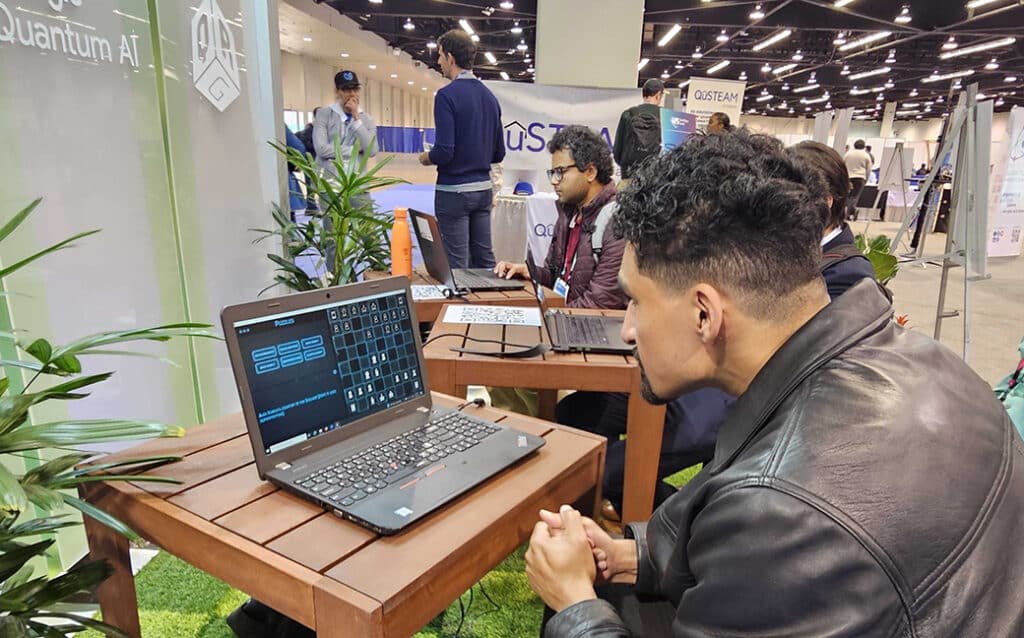According to Seth Lloyd, a quantum computing expert and professor of mechanical engineering at MIT, newborn babies are the only people alive who intuitively understand quantum mechanics – something that fades as they grow older.
Until about three months old, babies engage in what can be known as A-not-B errors, demonstrating an understanding similar to concepts in quantum physics. As they begin learning to play games such as peekaboo, they shift their focus to more human-scale physics.
What if we nurtured this early perspective?
While it’s not practical to teach infants quantum mechanics (although Chris Ferrie did write Quantum Physics for Babies), we can introduce basic topics to future leaders at a young age while they are in school. And fortunately, this has begun to take place across the globe.
Organizations and programs such as QubitxQubit and Quantum Quickstart are already paving the way, fostering students’ early curiosity and making quantum accessible and engaging for the next generation.
QubitxQubit has trained over 22,500 K-16 students and professionals in quantum computing education across 130 countries and all 50 states in the U.S.. Partnering with institutions and technology companies like Microsoft, University of Maryland, and Caltech, QubitxQubit aims to train future professionals.
Participants in their program benefit from hands-on experiences that allow K-12 students, university students, educators, and current industry professionals to learn fundamental quantum skills, run code on quantum computers, and work with leading global quantum researchers.
Meanwhile, the Quantum Quickstart program, offered by the Pritzker School of Molecular Engineering faculty at the University of Chicago, provides a one-week accelerated course for outstanding high school students passionate about STEM. This program introduces students to advances in quantum sciences and the foundations of quantum mechanics.
Students can learn about quantum through lectures, theoretical discussions, and tours of world-class lab facilities. They also can see the inner workings of quantum computers and participate in quantum-adapted board games.
As the program concludes, students attend sessions focused on preparing them for future careers in STEM, and they meet with university admissions counselors to gain insight into the college admissions process.
Additionally, organizations like Girls in Quantum are dedicated to shaping the future of quantum technology, specifically for girls and teenagers. As a global organization, they provide a safe space to explore quantum computing through free educational resources, empowering the next generation to get involved in this ever-evolving field.
Another early program with a similar mission is Q-munity. It was created by Anisha Musti, who was a teenager herself when she launched it. Still thriving today, Q-munity is now part of Resonance Holdings, the parent company of The Quantum Insider.
Inspired by the organization Women in Quantum, Diversity in Quantum, or DiviQ, aims to empower all underrepresented communities within quantum. Co-founded by Denise Raffner, DiviQ was established to create support networks, mentorship opportunities, events, and safe spaces for everyone looking to start or advance their career in quantum.
While the program caters to all ages, DiviQ has successfully paired over 400 quantum students, graduates, and early career professionals with mentors across the quantum industry.
As the quantum industry continues to expand, and with next year’s International Year of Quantum (IYQ) rapidly approaching, these organizations are essential in ensuring that a diverse and empowered workforce is ready to tackle the challenges and opportunities of the future. By nurturing curiosity, fostering inclusion, and providing essential resources, we can help cultivate the next generation of quantum innovators and leaders.
By continuing to support and invest in these organizations and programs, we can look forward to a promising future in quantum technology. As this industry evolves, we all have the unique opportunity to shape it differently—fostering inclusivity and encouraging young minds to explore. Quantum technology is the future, so why not empower and educate the future leaders of tomorrow to engage with it today?




